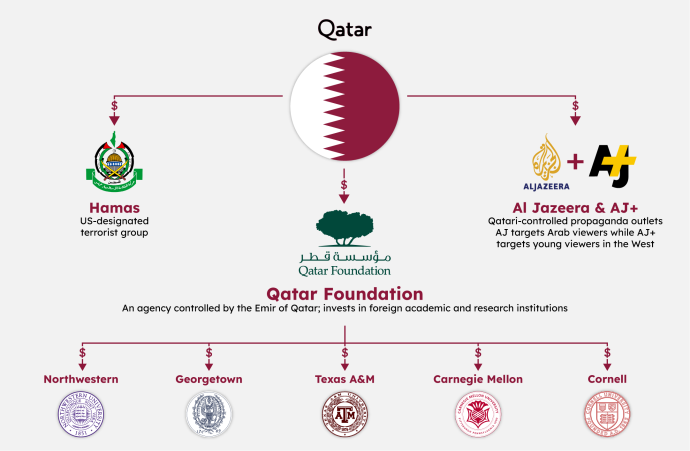Why would a respectable public American university decide to shut down its Middle East campus, sacrificing international prestige and hundreds of millions of dollars in donations from a tiny Gulf country with almost unlimited oil wealth?
Zachor Legal Institute spent over five years in litigation with Qatar to obtain information about its activities at Texas A&M, a public university. Our original premise was that Qatar, an incredibly wealthy country with a long history of funding terrorists, may also be funding radical student groups in the United States.
According to the contracts we secured, Texas A&M was handing over intellectual property to Qatar. The agreements were signed between Texas A&M and the Qatar Foundation, a government-controlled agency that maintains the relationships between Qatar and foreign universities.

These contracts allowed Qatar to obtain control of discoveries made at the Doha campus using Texas A&M’s world-class resources, including those related to nuclear research. For example, here is an excerpt from one of the contracts:
“The Qatar Foundation shall own the entire right, title, and interest in all Technology and Intellectual Property developed at (Texas A&M University Qatar) or under the auspices of its Research Program.”
Americans rightfully expect that information with sensitive military and commercial value will not be shared with countries that sponsor terrorism or promote anti-American propaganda. Qatar does both.
Qatar supports and maintains a close relationship with the US-designated terror group, Hamas and the Islamic Republic of Iran. Qatar also uses its propaganda arm, Al Jazeera, and billions of dollars of purchased influence in numerous American universities to spread anti-American and anti-Israel propaganda.
The audacity of Texas A&M and Qatar cannot be overstated. They bypassed the national security concerns of the US government to set their independent foreign policy, which includes potentially giving Qatar and Iran access to highly classified technology that can put Americans and the entire civilized world in harm’s way.
Qatar doesn’t believe in transparency, but what about Texas?
Both Texas A&M and its patrons at the Qatar Foundation made it extremely difficult to review the public information we requested. We initially filed a public records request in early 2018, requesting information about how much funding Texas A&M received from the obscure, terror-enabling country that was funneling significant amounts of money to major US universities.
Rather than providing us with the information we were legally entitled to according to the Texas Public Records Act, the Qatar Foundation filed a lawsuit petitioning the Texas Attorney General to enable the university to suppress the delivery of public records.
At the first hearing of the case, the Texas judge responded to Qatar’s attorneys by asking simply, “Don’t the people of the State of Texas have a right to know what a hostile foreign country is doing to influence our flagship public university?”
Judicial Watch represented us during five years of litigation until the Texas court finally ruled in our favor and ordered Texas A&M to produce the relevant records.
What we found in the contracts was a comprehensive scheme whereby Texas A&M essentially sold Qatar cutting-edge intellectual property focusing on engineering and science, including, we believe, access to Texas A&M’s renowned nuclear science program via intellectual property assignments.
Not long after this information was made public, Texas A&M announced the closure of its campus in Qatar.
Significant Questions Remain Open
Despite the important decision of Texas A&M to shut down its Doha campus, two important questions remain open:
- What nuclear and other sensitive military-grade intellectual property was made available to Qatar, and likely to Iran as well?
- What did the other prestigious North American and European universities with campuses in Qatar, including Carnegie Mellon, Cornell, Georgetown, and Northwestern, agree to in exchange for billions of dollars from Qatar?
The exposure of Texas A&M is likely only the tip of the iceberg on how Qatar, directly and indirectly, influences American institutions and public opinion. Therefore, it is critical to continue shedding light on this largely undocumented meddling in American domestic and international affairs.
Marc Greendorfer is the co-founder and President of Zachor Legal Institute, a US-based legal think tank and advocacy organization. Ron Machol is the COO of Zachor Legal Institute.
This op-ed is published in partnership with a coalition of organizations that fight antisemitism across the world. Read the previous article by Adam Milstein.
